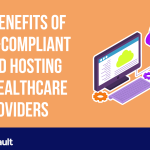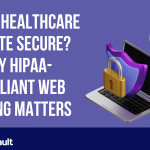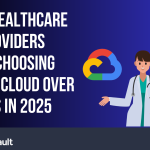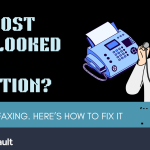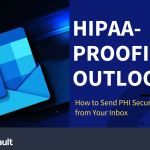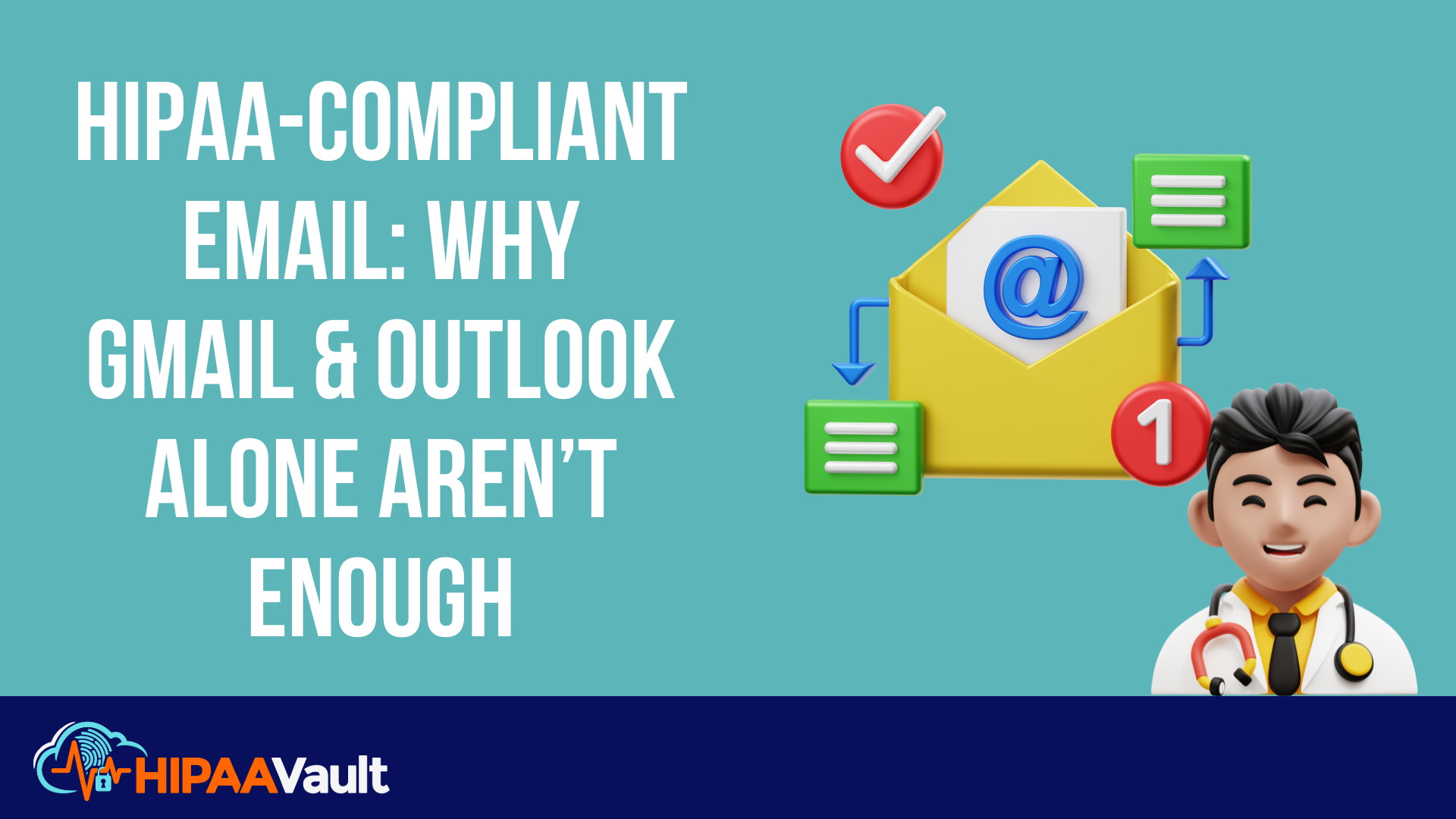
The Hidden Risk in Healthcare Email: Are You Putting Patient Data at Risk?
Did you know that 95% of healthcare security breaches involve email? A single unsecured email can expose sensitive patient data, leading to HIPAA violations, costly fines, and loss of trust. Despite their popularity, standard email platforms like Gmail and Outlook don’t provide the security and compliance safeguards needed to protect electronic Protected Health Information (ePHI).
If your healthcare organization relies on these platforms without additional security layers, you may be at risk. Let’s explore why these email services fall short, what HIPAA requires for secure email communication, and how HIPAA Vault can help you ensure compliance and protect patient data.
Why Standard Email Platforms Are Not HIPAA-Compliant
Email is an indispensable communication tool in healthcare, facilitating patient interactions, appointment scheduling, and coordination between medical professionals. However, standard email platforms like Gmail and Outlook fall short of meeting HIPAA compliance standards. While these services offer some security measures, they lack the robust safeguards necessary to protect electronic Protected Health Information (ePHI), as mandated by HIPAA regulations.
Healthcare organizations that rely on non-compliant email services expose themselves to severe security risks, potential regulatory fines, and irreparable damage to their reputation. Understanding the limitations of these platforms and adopting a secure email solution is crucial for compliance and patient data protection.
Risks of Using Non-Compliant Email Providers
Using non-HIPAA-compliant email platforms can expose healthcare organizations to several risks, including:
- Unauthorized Access: Without strict access controls, standard email providers increase the risk of unauthorized individuals accessing sensitive patient data.
- Lack of Encryption: HIPAA mandates encryption for emails containing ePHI, yet most free or basic business email services fail to provide the necessary encryption.
- Phishing & Cyberattacks: Cybercriminals frequently target healthcare organizations through phishing emails, malware, and ransomware, exploiting vulnerabilities in unsecured email systems.
- Regulatory Fines: HIPAA violations resulting from email-related data breaches can lead to substantial fines, sometimes reaching millions of dollars.
- No Business Associate Agreement (BAA): HIPAA requires covered entities to sign a BAA with email service providers to ensure compliance. Gmail and Outlook’s free versions do not offer BAAs, leaving organizations non-compliant.
Requirements for HIPAA-Compliant Email
To ensure compliance, an email service must adhere to specific HIPAA requirements, including:
1. Encryption
HIPAA requires encryption for emails containing ePHI, ensuring data remains protected during transmission and at rest. Without encryption, emails are susceptible to interception by unauthorized parties.
2. Access Controls & Authentication
Implementing multi-factor authentication (MFA) and role-based access controls helps prevent unauthorized access to sensitive medical information, reinforcing security.
3. Audit Logs & Monitoring
Organizations must track and log all email activities to detect potential security threats, monitor suspicious behavior, and maintain compliance records.
4. Business Associate Agreement (BAA)
A HIPAA-compliant email provider must sign a BAA, affirming their responsibility to maintain compliance and uphold strict security measures.
5. Secure Email Archiving
Emails containing ePHI should be securely archived to enable future reference, ensure compliance audits, and meet record retention requirements.
How HIPAA Vault Secures Email Communications
HIPAA Vault provides a robust HIPAA-compliant email solution with a range of essential security features, ensuring full regulatory compliance:
- Encryption: Our email platform guarantees encryption of all messages, securing PHI in transit and at rest.
- Business Associate Agreement (BAA): We sign a legally binding BAA with our clients, ensuring full adherence to HIPAA regulations.
- Advanced Threat Protection: AI-powered spam filtering, phishing detection, and malware prevention proactively defend against cyber threats.
- Multi-Factor Authentication (MFA): Additional authentication layers reinforce protection against unauthorized access attempts.
- 24/7/365 Monitoring & Support: Our dedicated security team offers continuous monitoring, instant threat detection, and rapid response to potential incidents.
Email Security Best Practices for Healthcare Providers
Beyond implementing a HIPAA-compliant email service, healthcare organizations should adopt security best practices to reinforce email protection:
- Train Staff on Email Security: Conduct regular training sessions to educate employees on identifying phishing emails and suspicious links.
- Use Strong Passwords & MFA: Enforce complex password policies and require multi-factor authentication for heightened security.
- Limit PHI in Emails: Avoid including excessive PHI in emails and utilize secure messaging alternatives when necessary.
- Regularly Audit Email Activity: Conduct periodic security audits to detect unauthorized access, policy violations, or suspicious activities.
- Keep Software Up to Date: Ensure email clients, security tools, and operating systems are updated to patch vulnerabilities and mitigate potential threats.
Case Study: Preventing Email-Related HIPAA Violations
A mid-sized healthcare clinic previously relied on standard Gmail accounts for patient communication. Unfortunately, a sophisticated phishing attack compromised their system, exposing sensitive patient data and resulting in a costly HIPAA violation. The clinic faced regulatory scrutiny and a significant reputational hit.
Recognizing the urgency of implementing a secure solution, the clinic transitioned to HIPAA Vault’s compliant email service. By incorporating encryption, multi-factor authentication, and AI-driven threat detection, they successfully mitigated email-related security risks. Since making the switch, they have maintained zero email-related security incidents, ensuring patient data confidentiality and regulatory compliance.
Conclusion: Switching to a HIPAA-Compliant Email Solution
While Gmail and Outlook are widely used for business communications, they do not meet HIPAA’s stringent security requirements by default. Healthcare organizations must take proactive steps to implement a HIPAA-compliant email solution to safeguard patient data, avoid regulatory fines, and maintain trust within the industry.
HIPAA Vault specializes in secure, HIPAA-compliant cloud hosting and email solutions tailored to the healthcare sector. By choosing HIPAA Vault, organizations gain access to enterprise-level security features, compliance expertise, and 24/7/365 support.
Ready to enhance your email security and ensure HIPAA compliance? Contact HIPAA Vault today to learn more about our secure email solutions.
Internal Links:

